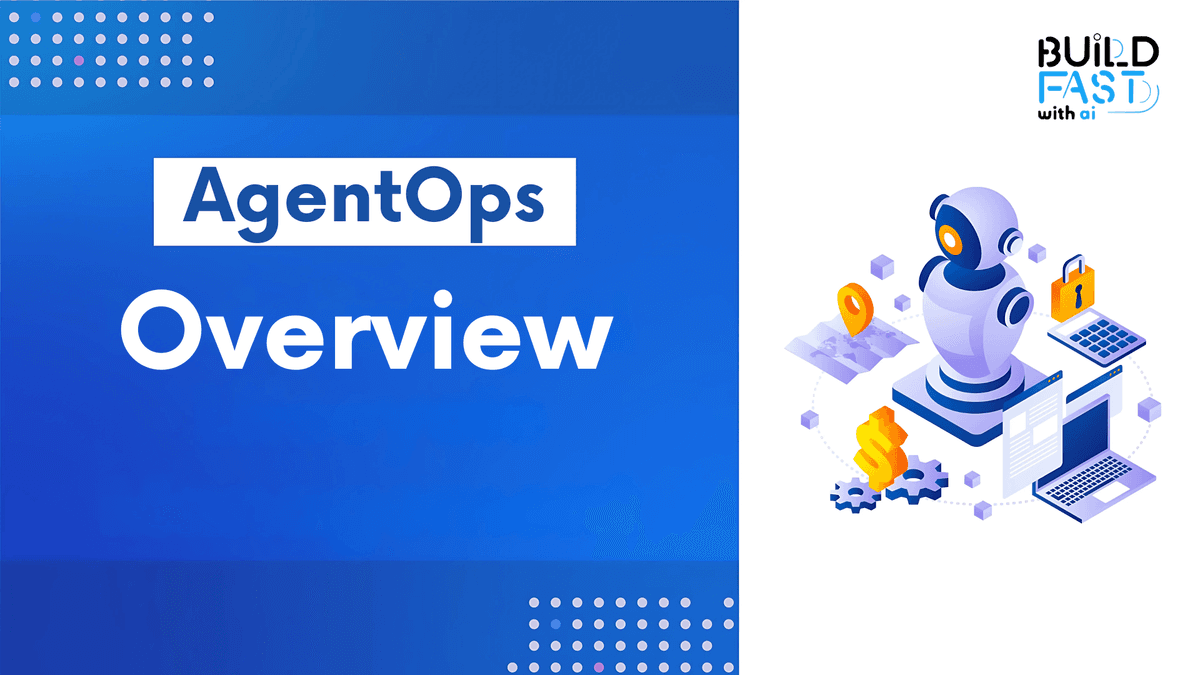Do you want to be a bystander in the world of tomorrow, or its creator?
Act now—Gen AI Launch Pad 2025 is your gateway to innovation.
Introduction
Artificial Intelligence (AI) agents are revolutionizing automation, but managing, evaluating, and optimizing them efficiently is a challenge. AgentOps is a powerful tool designed to help developers build, debug, and monitor AI agents from prototype to production.
This blog explores AgentOps' key features, installation, and practical applications using Python. By the end, you'll know how to:
- Set up AgentOps in your projects
- Monitor AI agent sessions and track costs, actions, and errors
- Debug and analyze execution flows for enhanced agent performance
- Implement multi-agent support with OpenAI and Gemini models
Let's dive in!
🚀 Getting Started with AgentOps
1️⃣ Installation & Setup
To begin, install AgentOps and LangChain:
!pip install agentops langchain_community
Next, set up API keys for OpenAI, Gemini, and AgentOps:
from google.colab import userdata
import os
OPENAI_API_KEY = userdata.get('OPENAI_API_KEY')
GEMINI_API_KEY = userdata.get('GOOGLE_API_KEY')
AGENTOPS_API_KEY = userdata.get('AGENTOPS_API_KEY')
2️⃣ Initialize OpenAI & AgentOps
from openai import OpenAI import agentops openai = OpenAI(api_key=OPENAI_API_KEY) agentops.init(AGENTOPS_API_KEY, default_tags=["openai-gpt-notebook"])
👉 Why is this important?
- This initializes AgentOps for tracking AI agent sessions and activities.
- It ensures seamless interaction between AgentOps and LLM providers like OpenAI and Gemini.
🔍 Analyzing AI Agent Behavior with AgentOps
3️⃣ Tracking AI Agent Execution
Monitor agent activity and debug interactions with step-by-step execution graphs:
message = [{"role": "user", "content": "Write a 12-word poem about secret agents."}]
response = openai.chat.completions.create(
model="gpt-3.5-turbo", messages=message, temperature=0.5, stream=False
)
print(response.choices[0].message.content)
✅ Expected Output:
Silent shadows move, secrets kept in the dark, agents unseen, unknown.
Key Features:
- Session Stats: Tracks execution duration, LLM usage, and error count.
- Session Replay: Generates a unique link to visualize agent interactions.
agentops.end_session("Success")
📌 Use Case: Debugging AI-generated responses, verifying output correctness.
💡 Cost & Compliance Tracking
4️⃣ Managing LLM Costs and Security
AgentOps helps developers track AI agent costs and prevent security risks like prompt injections.
agentops.start_session(tags=["openai-gpt-notebook-events"])
Session Replay Link: 🖇 AgentOps Session Replay
agentops.end_session("Success")
Key Benefits:
- Monitor model usage and expenses
- Detect security vulnerabilities (prompt injections, data leaks)
- Ensure compliance with AI best practices
📌 Use Case: Budget tracking for AI-powered applications.
🤖 Multi-Agent Support with AgentOps
5️⃣ Implementing Multi-Agent Workflows
AgentOps can track interactions between multiple AI agents, such as a QA agent and a Software Engineer agent.
Define AI Agents:
from agentops import track_agent
@track_agent(name="qa")
class QaAgent:
def completion(self, prompt: str):
res = openai.chat.completions.create(
model="gpt-4o",
messages=[{"role": "system", "content": "You are a QA engineer and only output Python code."},
{"role": "user", "content": prompt}],
temperature=0.5,
)
return res.choices[0].message.content
@track_agent(name="engineer")
class EngineerAgent:
def completion(self, prompt: str):
res = openai.chat.completions.create(
model="gpt-3.5-turbo",
messages=[{"role": "system", "content": "You are a software engineer and only output Python code."},
{"role": "user", "content": prompt}],
temperature=0.5,
)
return res.choices[0].message.content
Initialize Agents & Generate Code
qa = QaAgent()
engineer = EngineerAgent()
generated_func = engineer.completion("Python function to test prime number")
print(generated_func)
✅ Expected Output:
def is_prime(num):
if num < 2:
return False
for i in range(2, int(num ** 0.5) + 1):
if num % i == 0:
return False
return True
📌 Use Case: AI-powered code generation and automated QA testing.
🔄 AI Model Integration: OpenAI & Gemini
6️⃣ Gemini Model Integration
AgentOps supports Google's Gemini model for AI workflows:
import google.generativeai as genai
genai.configure(api_key=GEMINI_API_KEY)
agentops.start_session(AGENTOPS_API_KEY)
model = genai.GenerativeModel("gemini-1.5-flash")
🔹 Test Synchronous Generation:
response = model.generate_content("What are the three laws of robotics?")
print(response.text)
✅ Expected Output:
1. A robot may not injure a human being... 2. A robot must obey the orders given... 3. A robot must protect its own existence...
📌 Use Case: AI-driven conversational agents using multiple LLMs.
🎯 Conclusion
AgentOps is an essential tool for AI developers, offering:
- Robust AI agent monitoring & debugging
- Cost tracking & security compliance
- Multi-agent workflow support
- Seamless OpenAI & Gemini integrations
By incorporating AgentOps into your workflow, you can optimize, debug, and scale AI agents effectively.
📖 Next Steps:
- Explore AgentOps Documentation
- Try integrating AgentOps with LangChain
- Experiment with custom AI agent monitoring solutions
- AgentOps Notebook
---------------------------
Stay Updated:- Follow Build Fast with AI pages for all the latest AI updates and resources.
Experts predict 2025 will be the defining year for Gen AI Implementation. Want to be ahead of the curve?
Join Build Fast with AI’s Gen AI Launch Pad 2025 - your accelerated path to mastering AI tools and building revolutionary applications.
---------------------------
Resources and Community
Join our community of 12,000+ AI enthusiasts and learn to build powerful AI applications! Whether you're a beginner or an experienced developer, this tutorial will help you understand and implement AI agents in your projects.
- Website: www.buildfastwithai.com
- LinkedIn: linkedin.com/company/build-fast-with-ai/
- Instagram: instagram.com/buildfastwithai/
- Twitter: x.com/satvikps
- Telegram: t.me/BuildFastWithAI


